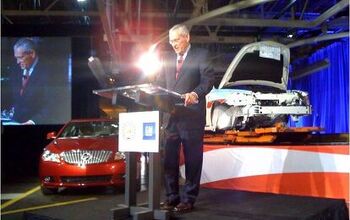Quote Of The Day: Government Motors By The Numbers Edition
My first day back at the helm of TTAC has been accompanied by an embarrassment of riches, in the form of both a GAO report on GM and Chrysler’s pension obligations, and the release of GM’s first post-bankruptcy, GAAP-approved financial results. We will continue to mine these documents for the most revealing quotes and statistics, but for now let’s take a moment to consider the political tensions caused by the auto industry bailout. TTAC has long held that political conflicts over the government’s stewardship of GM and Chrysler is a pressing concern, nearly on par with the financial ramifications of the auto bailout, and today’s GAO report confirms our concerns. As the following quote reveals, Treasury is under constant pressure to accommodate political concerns over the management of its stakes in GM and Chrysler, and has received no fewer than 300 official letters from congressional representatives, eager to subordinate the long-term health of the bailed-out automakers to their local concerns.
Recognizing the potential for interested parties to perceive conflicts, Treasury has taken several other steps to mitigate its risk. First, to guide its oversight of the investments going forward and limit its involvement in the day-to-day operations of the companies, Treasury developed four core principles: (1) acting as a reluctant shareholder, for example, by not owning equity stakes in companies any longer than necessary; (2) not interfering in the day-to-day management decisions; (3) ensuring a strong board of directors; and (4) exercising limited voting rights. According to Treasury officials, use of these core principles defines the operating boundaries of the federal role within its ownership context by limiting the reach and ability of the government to exert its powerful influence on the business and operational matters of these companies. Officials noted that the core principle of not interfering in day-to-day decisions has been particularly helpful in dealing with political pressures related to business operations. For example, officials said that Treasury’s auto team received about 300 congressional letters in 2009 regarding day-to-day management issues involving GM and Chrysler. Several of these letters asked about company decisions and strategies, or called on Treasury to exert influence on the companies’ business decisions. Some letters lobbied either in favor of or against a certain practice or activity. Other letters have been passed along on behalf of a particular constituent concern. Treasury officials said that, because of their core principle, most of the time they can simply reply to such letters by reiterating their policy of not getting involved with the companies’ business decisions, and as a result, they have been able to avoid having to respond to these pressures.
What appears to be missing from the last sentence of this quote is the phrase “thus far.” With GM and Chrysler’s profitability, worker benefits, and the health of America’s pension guarantee system hanging in the balance, Treasury can likely expect such political pressure to increase. Though measures are in place through which the Treasury claims to have been able to rebuff such political advances, as these two firms move closer to an IPO, there are too many competing interests to balance to ensure an apolitical outcome. I joked once, in a long-ago podcast, that America’s investment in and partial ownership of GM and Chrysler might make sense if our government were in fact a totalitarian regime, as it would be able to have a clearly defined goal for its intervention. But because of our democratic system, representatives can and should seek to interfere in government policies on behalf of their constituents, creating intense pressure on any attempt to neutrally manage such a massive investment, especially one that can have the power of life and death over local economies. We’ve already seen examples of interference take place, and political exigencies may well have played a role in a number of GM and Chrysler’s business decisions. Until such time as the Treasury divests its stakes in these two automakers, it (and the automakers themselves) will continue to face political consequences for nearly every decision they make going forward.
More by Edward Niedermeyer
Latest Car Reviews
Read moreLatest Product Reviews
Read moreRecent Comments
- Lorenzo They won't be sold just in Beverly Hills - there's a Nieman-Marcus in nearly every big city. When they're finally junked, the transfer case will be first to be salvaged, since it'll be unused.
- Ltcmgm78 Just what we need to do: add more EVs that require a charging station! We own a Volt. We charge at home. We bought the Volt off-lease. We're retired and can do all our daily errands without burning any gasoline. For us this works, but we no longer have a work commute.
- Michael S6 Given the choice between the Hornet R/T and the Alfa, I'd pick an Uber.
- Michael S6 Nissan seems to be doing well at the low end of the market with their small cars and cuv. Competitiveness evaporates as you move up to larger size cars and suvs.
- Cprescott As long as they infest their products with CVT's, there is no reason to buy their products. Nissan's execution of CVT's is lackluster on a good day - not dependable and bad in experience of use. The brand has become like Mitsubishi - will sell to anyone with a pulse to get financed.


































Comments
Join the conversation
If you are someone who really thinks that US government involvement in a sick car company like GM can effect positive results, let's ponder how government involvement with a healthy, robust company like American Honda would improve that firm even further. I'm not talking just mpgs and crash standards but overall design and the whole vision thing. Do you think Honda's designs and customer satisfaction would become even better after a car czar and the 'working group' from the Treasury had their influence?
The positive effect of the US government in GM is to keep the jobs during this deep recession everything else is extra.